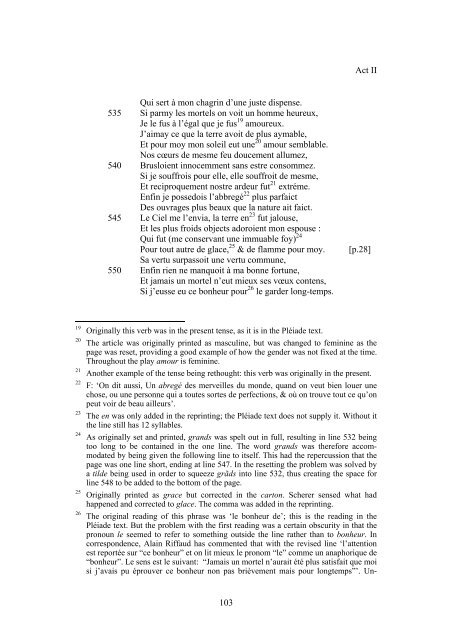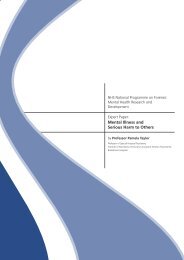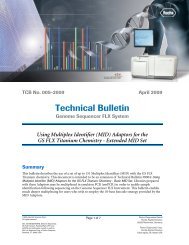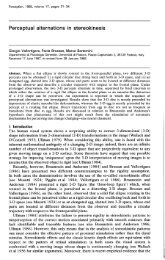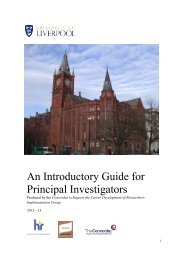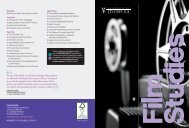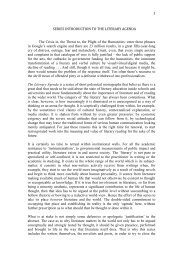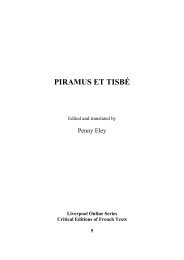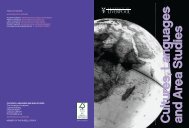LA MORT DE MITRIDATE - University of Liverpool
LA MORT DE MITRIDATE - University of Liverpool
LA MORT DE MITRIDATE - University of Liverpool
You also want an ePaper? Increase the reach of your titles
YUMPU automatically turns print PDFs into web optimized ePapers that Google loves.
Act II<br />
Qui sert à mon chagrin d’une juste dispense.<br />
535 Si parmy les mortels on voit un homme heureux,<br />
Je le fus à l’égal que je fus 19 amoureux.<br />
J’aimay ce que la terre avoit de plus aymable,<br />
Et pour moy mon soleil eut une 20 amour semblable.<br />
Nos cœurs de mesme feu doucement allumez,<br />
540 Brusloient innocemment sans estre consommez.<br />
Si je souffrois pour elle, elle souffroit de mesme,<br />
Et reciproquement nostre ardeur fut 21 extréme.<br />
Enfin je possedois l’abbregé 22 plus parfaict<br />
Des ouvrages plus beaux que la nature ait faict.<br />
545 Le Ciel me l’envia, la terre en 23 fut jalouse,<br />
Et les plus froids objects adoroient mon espouse :<br />
Qui fut (me conservant une immuable foy) 24<br />
Pour tout autre de glace, 25 & de flamme pour moy.<br />
Sa vertu surpassoit une vertu commune,<br />
550 Enfin rien ne manquoit à ma bonne fortune,<br />
Et jamais un mortel n’eut mieux ses vœux contens,<br />
Si j’eusse eu ce bonheur pour 26 le garder long-temps.<br />
[p.28]<br />
19<br />
20<br />
21<br />
22<br />
23<br />
24<br />
25<br />
26<br />
Originally this verb was in the present tense, as it is in the Pléiade text.<br />
The article was originally printed as masculine, but was changed to feminine as the<br />
page was reset, providing a good example <strong>of</strong> how the gender was not fixed at the time.<br />
Throughout the play amour is feminine.<br />
Another example <strong>of</strong> the tense being rethought: this verb was originally in the present.<br />
F: ‘On dit aussi, Un abregé des merveilles du monde, quand on veut bien louer une<br />
chose, ou une personne qui a toutes sortes de perfections, & où on trouve tout ce qu’on<br />
peut voir de beau ailleurs’.<br />
The en was only added in the reprinting; the Pléiade text does not supply it. Without it<br />
the line still has 12 syllables.<br />
As originally set and printed, grands was spelt out in full, resulting in line 532 being<br />
too long to be contained in the one line. The word grands was therefore accommodated<br />
by being given the following line to itself. This had the repercussion that the<br />
page was one line short, ending at line 547. In the resetting the problem was solved by<br />
a tilde being used in order to squeeze grãds into line 532, thus creating the space for<br />
line 548 to be added to the bottom <strong>of</strong> the page.<br />
Originally printed as grace but corrected in the carton. Scherer sensed what had<br />
happened and corrected to glace. The comma was added in the reprinting.<br />
The original reading <strong>of</strong> this phrase was ‘le bonheur de’; this is the reading in the<br />
Pléiade text. But the problem with the first reading was a certain obscurity in that the<br />
pronoun le seemed to refer to something outside the line rather than to bonheur. In<br />
correspondence, Alain Riffaud has commented that with the revised line ‘l’attention<br />
est reportée sur “ce bonheur” et on lit mieux le pronom “le” comme un anaphorique de<br />
“bonheur”. Le sens est le suivant: “Jamais un mortel n’aurait été plus satisfait que moi<br />
si j’avais pu éprouver ce bonheur non pas brièvement mais pour longtemps”’. Un-<br />
103


